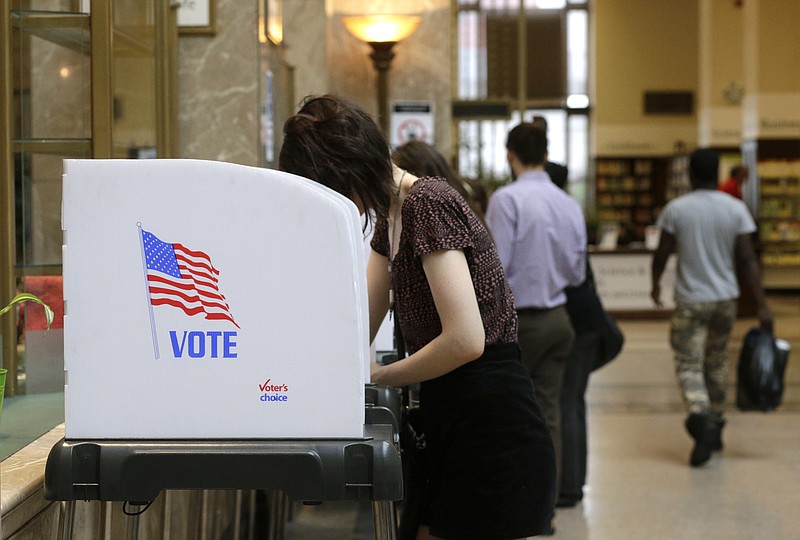WASHINGTON - Donald Trump attracted a broad coalition of Republican voters as he won presidential primary elections in Connecticut, Maryland and Pennsylvania on Tuesday, pulling in support from young and old, men and women and those who want a candidate who will shake things up.
Trump also won the GOP primaries in Delaware and Rhode Island, two states where exit polls were not conducted.
On the Democratic side, former Secretary of State Hillary Clinton drew overwhelming support from women and black voters as she beat Vermont Sen. Bernie Sanders in the Maryland and Pennsylvania primaries. Clinton also won in Delaware, while Sanders took Rhode Island.
Voters in Connecticut, Pennsylvania and Maryland also weighed in on how they feel Wall Street influences the economy.
Those were among the early findings from exit polls conducted for The Associated Press and television networks by Edison Research.
Other highlights from the exit polls:
___
TRUMP'S COALITION
Trump won across nearly all demographic groups- age, gender and education levels - in Connecticut, Maryland and Pennsylvania.
The billionaire businessman also did well with those most concerned about the state of the U.S. economy, and he bested Texas Sen. Ted Cruz and Ohio Gov. John Kasich with voters who want the next president to tell it like it is or bring needed change to the country.
Overall, a large majority of Republican voters in all three states want the candidate with the most votes in the primaries to prevail at the party convention in Cleveland - and most of them supported Trump.
___
CLINTON'S VICTORIES
Clinton was supported by three-quarters of black voters, who made up nearly half of all voters in the state. Two-thirds of women and more than half of men supported Clinton over Sanders, as did all age groups except those under 30.
More than 7 in 10 Maryland Democratic voters saw Clinton as the better candidate to beat Trump, 6 in 10 said she was the best candidate to handle gun policy and more than half saw her as the more inspiring candidate.
Six in 10 want a continuation of President Barack Obama's policies rather than a move to more or less liberal policies. Three-quarters of those wanting a continuation supported Clinton.
In Pennsylvania, Clinton won with the support of black voters, women and those looking for an experienced candidate who can win in November.
More than 6 in 10 Democratic voters in the state said Clinton has the best chance of beating Trump in November. Clinton was supported by most of those who identified themselves as moderate or somewhat liberal, but she also pulled even with Sanders among those saying they were very liberal.
___
ANTI-CRUZ VOTERS
For Cruz, it was a rough night. Four in 10 in Connecticut, a third in Pennsylvania and three in 10 in Maryland said they wouldn't vote for Cruz if he was the GOP nominee. And in Pennsylvania, nearly 6 in 10 say they would be either concerned or scared about a Cruz presidency.
Still, in Pennsylvania, Trump was more polarizing than either of the other candidates. While over a third of GOP voters said they would be excited by a Trump administration, another third said they would be scared or concerned.
___
WALL STREET INFLUENCE
Few Democrats voting in three states with exit polls Tuesday had a positive view of Wall Street, but Sandersvoters were more likely than Clinton voters to have a negative view of the nation's financial services industry.
In Connecticut and Pennsylvania, about two-thirds of Democrats say Wall Street hurts the American economy. But across both states, about 8 in 10 Sanders voters say Wall Street hurts the economy, while Clinton voters were more divided on the question.
On the GOP side, voters' feelings are more mixed about the influence of the financial sector on the economy. In Pennsylvania, about half of Republicans say Wall Street harms the economy and 4 in 10 say it is a positive force.
Connecticut and Maryland Republicans are slightly more positive about Wall Street: in both states about half say it helps the economy and about 4 in 10 say it is detrimental.
___
The surveys were conducted for The Associated Press and television networks by Edison Research as voters left their polling places at 25 to 35 randomly selected sites in Pennsylvania, Connecticut and Maryland.
Preliminary results include interviews with 1,223 to 1,313 Democratic primary voters and 745 to 1,228 Republican primary voters in each state. The results among all those voting in each contest have a margin of sampling error of plus or minus either 4 or 5 percentage points.
